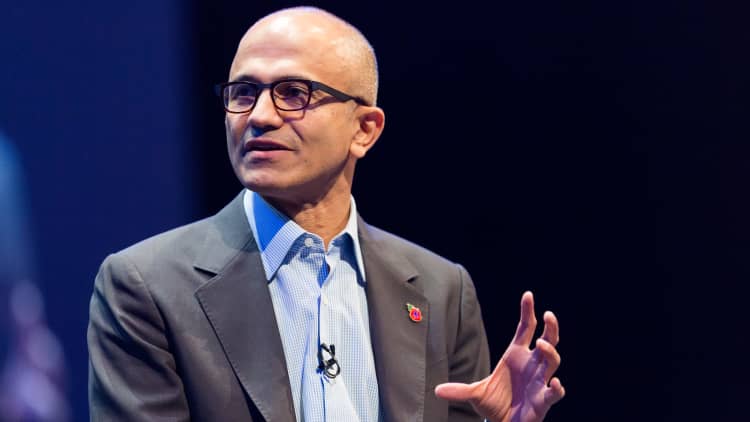
Microsoft CEO Satya Nadella spoke to CNBC's "Squawk Alley" on Tuesday.
"You don't want to change everything," Nadella told CNBC's Jon Fortt. "You want to change the things that matter the most, to be able to really go after the new concepts."
Nadella took over from Steve Ballmer as Microsoft's CEO in February 2014.
It's a big week for Microsoft: The company is announcing a slew of product updates at its annual conference, Microsoft Ignite, in Orlando, Fla. For instance, Microsoft is wooing new customers through software called Microsoft 365 F1, and is introducing more cloud services.
And Nadella, Microsoft's third-ever CEO, has announced a new book about Microsoft's future, called "Hit Refresh."
"This entire metaphor of even Hit Refresh is we as individuals are dealing with change all the time, and we're hitting refresh -- we learn from it," Nadella said. "The same is true for organizations, and the same is true for our society."
Nadella said the company is happy with the accelerating organic growth of LinkedIn's revenue since Microsoft acquired it last year.
"That's the first sign of a very healthy franchise," Nadella said.
Nadella's company has been active in supporting immigration into the U.S.
"Before we are critical about our immigration policy, the fact that the U.S. is the beacon of hope and the attractor of talent from all over the world is something that we should hold as precious," he said. "That's where the criticism comes from, not in terms of anything else."
American technology reached India-born Nadella when he was growing up, he said, and helped him "dream the dream," and after immigrating to the U.S., he came to "live the dream."
Fortt asked Nadella about the recent expansion of the company's Artificial Intelligence and Research group from 5,000 to 8,000 people, at a time when Alphabet, Facebook and other companies have also been investing in AI research.
"In some sense that's the existential question for us," Nadella said. "Forty-three years after our formation, one of the things that we have realized is whatever novel new concept you've come up with ultimately will stop being novel. You will need to come up with the next thing."
The company's researchers had been exploring AI, and specifically speech recognition, for many years, Nadella said.
"It was in 1995," he said, "when Bill said, 'You know, this speech recognition thing is going to be important -- let's get started.'" If anything, he said, it's about taking a long-term approach and then "seizing these market opportunities when they arrive."
Fortt also asked Nadella about whether it's risky to let Microsoft's Cortana voice assistant talk with Amazon's Alexa.
But there are "probably, what, 5, 10 million" voice-first devices, Nadella replied. "It's just minuscule. I think what is most important for us is to start making it a daily habit," he said, speaking of people using ambient-computing and voice-activated systems.
"The strength that we have is around productivity and communications and things that professionals need, even in a voice-first world," Nadella said. "Just like how we took our Office 365 apps and put it on iOS and Android, we want to make sure that our voice-first applications are also available on all platforms. So that's the fundamental construct behind it."


